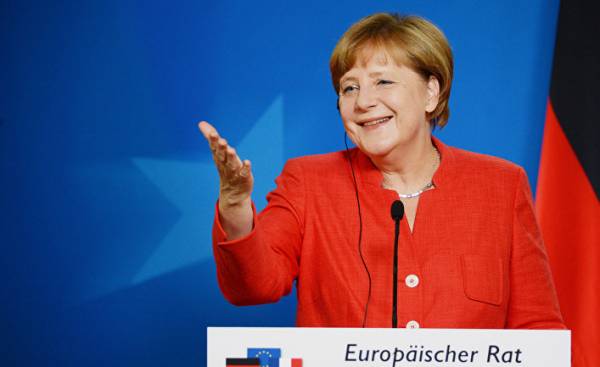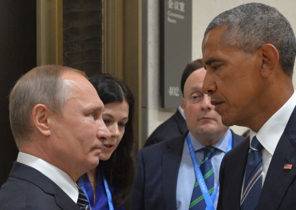
The front lines are drawn. At the summit of “Big twenty” in Hamburg, where this week gathered the world’s largest economy emerged the stage for clashes between protectionist America and defending the principles of free trade with Germany.
President Donald trump has brought US from one trade agreement — the Transatlantic partnership — and demanded to renegotiate the North American free trade agreement. It is now considering the possibility of introducing duties on imports of steel — such a move would almost certainly provoke retaliatory measures. The threat of a trade war is accompanied by a trump presidency from January 2017. Meanwhile Angela Merkel, Chancellor of Germany, hosting the summit of “Big twenty” in this year, continues to uphold the principles of free trade. 29 June, she delivered a speech, which was a thinly disguised attack against trump and in which she strongly criticized the forces of protectionism and isolationism. The agreement, which will soon signed by Japan and the European Union, will attest her words.
There is no doubt who wins this dispute. The doctrine of Mr. trump, the fact that trade must be balanced, to be fair, is a manifestation of economic illiteracy. His belief that the fees will help to level the playing field, naive and dangerous. However, at least in one respect, Mr. Trump has managed to capture the inconvenient truth. He criticized Germany for its trade surplus, which last year amounted to almost $ 300 billion — on this indicator Germany took first place in the world, overtaking even China, whose trade surplus amounted to only $ 200 billion. Perhaps the measures he is threatening to take — to put an end to the sales of German cars — are counterproductive, but the fact remains: Germany is too much saving and too little spending. And size savings in Germany, and also the tenacity with which she continues to save, make it quite a clumsy defender of the principles of free trade.
Defective harmony
Trade surplus is a situation when national savings exceeds domestic investment. In the case of Germany this situation is not a result of the mercantilist policies of the government, what is often spoken by foreigners. She, according to German officials, also reflects the acute needs of the ageing population in increasing their savings. The level of savings of households over many years has been stable, and the growth of national savings achieved by companies and governments.
The basis of the current account surplus Germany is the agreement between business and trade unions, which requires to restrain wage growth in order to preserve the competitiveness of export industries. This moderation rendered export-oriented economy Germany is a good service, to facilitate its rapid recovery and growth in the postwar period. It is this innate desire for sobriety helps explain the rapid transformation of Germany from the European States, are experiencing a difficult period in the 1990-ies in the modern champion.
In the German model has many positive features. Harmony in relationships between business executives and their employees has become one of the main reasons for the high indicators of the German economy. Companies can freely invest their money without fear that the unions will demand compensation. The state also played a role, sponsirovat the system of vocational training, which many admired. In America the prospects for men are not graduating from high school, deteriorated along with a reduction in the number of jobs in industrial enterprises — this was the cause of the rise of economic nationalism espoused by Mr. trump. Germany, too, has failed fully to avoid it, but compared to America it could save many more jobs in industrial enterprises. This was one of the reasons why the populist party “Alternative for Germany” is still on the sidelines of German politics.
However, the negative reverse side of this model have recently become more apparent. This model provokes a serious imbalance in the German economy and world trade. The wage restraint leads to a decrease in the country and imports. Consumer spending dropped to 54% of GDP — for comparison, in America, they comprise 69%, and in the UK 65%. Exporters do not want to invest their large profits inside the country. In this sense, Germany is not alone: Sweden, Switzerland, Denmark and the Netherlands also have significant surpluses of the current account.
If the current account surplus of a large economy, characterized by full employment, is more than 8% of GDP, it becomes a serious burden on the global trading system. To compensate for such surpluses and to maintain a sufficiently high aggregate demand, so that people continued to work, other countries should borrow and spend it with the same ease. In some countries, particularly in Italy, Greece and Spain, persistent deficits eventually turned into crises. And their subsequent transition to surplus is very expensive they cost. Continued excess savings in Northern Europe made this transition without the need for painful. In the 1970s and 1980s, when inflation was high, the tendency of the German saving for the future served as a stabilizing force. Now it has become a brake on global growth and the target of criticism for protectionists like Mr. trump.
The rejection of thrift
Is it possible somehow to solve this problem? Perhaps a trade surplus of Germany will be nullified due to a sharp growth of wages, as happened with China. Now the unemployment rate in Germany is less than 4%, and the number of working-age population will be reduced, despite the high rate of immigration. After several decades of decline in the cost of housing in Germany begins to grow, and this means that today on the same salary, you can afford less than before. The institutions that served as the basis for wage moderation, are losing their influence. The Euro could rise. However, caution is deeply ingrained in the minds of the Germans. Last year wages grew by only 2.3% is less than in the previous two years. If the surplus is not correct, may require many years to ensure that it has reached a reasonable level.
The German government should increase spending. The structural fiscal balance Germany has changed from a deficit of 3% of GDP in 2010 to a small surplus. Officials call this frugality, however, given the high level of savings in the private sector, it’s hard to believe. Germany has a great many worthy projects on which to spend money. Building schools and roads in Germany is gradually declining due to the lack of public investment. The German economy is lagging behind in terms of readiness for the widespread introduction of digital technology, ranking 25 in the world in average download speed. If the government expanded the system of after-hours childcare, that would enable women to work full-time, increasing the degree of women’s participation in the economy. Some experts argue that such an extension is impossible because of full employment. However, in the framework of a market economy is a time-tested way to fight for limited resources: we need to pay more.
Germany is high time to recognize that its excessive accumulation is its weak spot. Ms. Merkel is absolutely right, saying about the advantages of free trade. But she and her compatriots have to understand that Germany’s surplus is in itself a threat to the legitimacy of free trade.







